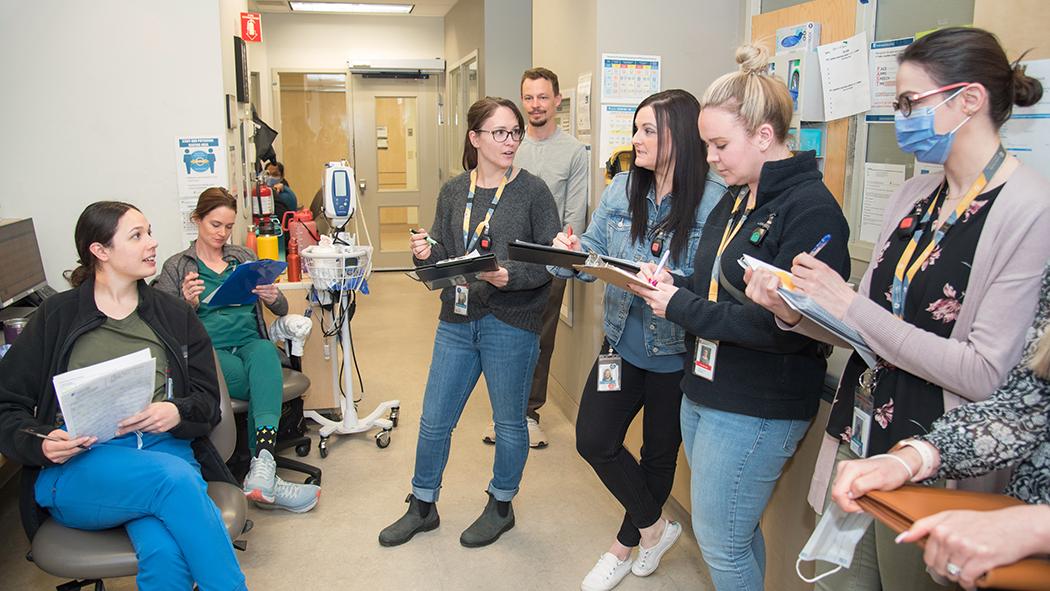
May 3, 2023
Stigma against those experiencing mental health and addictions persists within society, even as awareness of these conditions have increased. The Adult Mental Health Inpatient/Outpatient Services at London Health Sciences Centre (LHSC) is taking steps to address stigma within the organization and within the city to ensure the needs of patients are being met.
Mental health and addiction stigma
“We’ve seen stigma for our patients in mental health and addictions range from a belief that they’re dangerous and should be feared and avoided, to the other end of the spectrum where people think that they lack strength and the initiative to do things for themselves,” says Lisa Higgins, Director, Adult Mental Health Inpatient/Outpatient Services at LHSC.
“The stigma becomes internalized in patients experiencing mental health issues and addiction,” notes Tammy Fisher, Director, Adult Mental Health Inpatient/Outpatient Services at LHSC. “We see people fear the shame and judgement of others and try to keep their mental health concern or addiction secret and delay seeking treatment. Some of our reactions to hearing someone was in hospital for a heart attack, for example, are quite different from hearing that someone was in the hospital for a mental health disorder. It’s looked at differently by society, our workplaces, and even loved ones.”
Stigma continues to influence how people suffering with mental health and addictions think about themselves and whether they seek care. When individuals experiencing mental health issues feel afraid to ask for help because of the fear of the response they may receive, it perpetuates those mental health issues.
Curiosity not judgement
Tammy and Lisa share how important it is to reframe approaches to working with patients experiencing mental health and addictions to begin to move beyond the lingering stigma about these health experiences.
Tammy explains, “We take a trauma-informed approach. Instead of looking at what may be problematic about their behaviour, we ask what happened to them. Our patients have extraordinary strength and resilience to continue trying new approaches to improve their mental health and recover from their addictions.”
The dedication of staff and physicians to approaching patients from a place of non-judgement is important to create a safe place for patients to be able to open up.
“Mental health care is a unique area within the hospital,” Lisa says. “The Mental Health and Addictions Program takes a recovery-oriented approach that values self-determination, dignity, hope, and partnership. The care and compassion staff and physicians bring to their patient interactions is something I’m proud to see.”
Building support
There are new initiatives within LHSC to help provide mental health and addictions support.
“Mental health is not provided in just one area in our hospital. We have a consultation liaison team that see patients with cancer or chronic pain, for example, who are at high risk of mental health disorders,” Lisa shares. “We also have an addictions consultation team that meets with patients in areas around the hospital to address the addictions needs of patients.”
The consultation services in the hospital are made up of clinicians including nursing, psychology and psychiatry, addictions workers and harm reduction workers that provide support and interventions to patients in hospital being treated for a medical condition but also are struggling with mental health and addictions. These services are critical in providing wholistic patient care and wellbeing within our walls.
Building community
When patients no longer require hospital-based services, whether inpatient or outpatient, community programs are there to provide continuing care.
“We have started to work in conjunction with community partners to better support patients’ transition of care from hospital to community,” Lisa notes. “Community partners are introduced sometimes as early as the admission stage to build that relationship before they leave hospital.”
Mental health is not a linear journey and negative experiences can create cascading effects that impede wellbeing. An example of this is losing housing. Housing is a determinant of health, and is a health and safety issue that is critical to mental health. LHSC is deeply committed to collaborating with community partners to advance the City of London’s health and homelessness work, focused on addressing homelessness in the city.
Patient and family partner involvement
“We’ve been fortunate to have such invested patient partners and family members that are working with us to help transform the system of care for mental health and addictions,” Tammy says. “Their voices and perspectives are so valuable in understanding how we need to change and in what ways, so we build something that works.”
Through engaging patient partners and family members, community partners, and by building services within our walls, LHSC’s Adult Mental Health Inpatient/Outpatient Services team is building bridges and filling gaps to continue to destigmatize mental health and addictions so critical services and supports are there when needed.